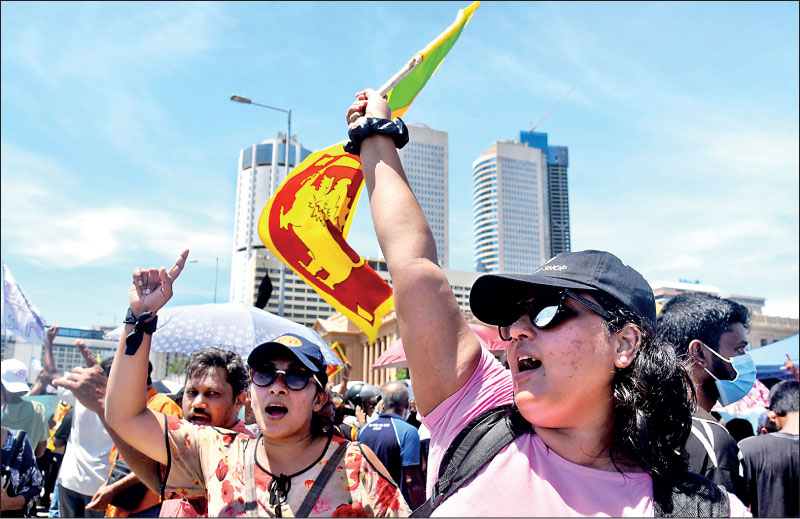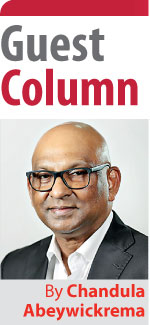Tuesday Feb 17, 2026
Tuesday Feb 17, 2026
Thursday, 26 May 2022 01:20 - - {{hitsCtrl.values.hits}}

“A body of men holding themselves accountable to nobody ought not to be trusted by anybody” – Thomas Paine
 The Aragalaya, the fourth youth uprising of the new generation of youth born after 1990 very clearly demanded a radical systemic change in the parliamentary and presidential structure, mechanism, and system. This is very critical for the country in going forward to create greater inclusivity from the enrichment of all the segments of the society in this country.
The Aragalaya, the fourth youth uprising of the new generation of youth born after 1990 very clearly demanded a radical systemic change in the parliamentary and presidential structure, mechanism, and system. This is very critical for the country in going forward to create greater inclusivity from the enrichment of all the segments of the society in this country.
The youth who are at the forefront of this Aragalaya are not willing to be stagnant within an archaic system that has been in place since Independence. With essentials such as food, fuel, electricity, cooking gas, and medicine not available, they have felt that the time is ripe to agitate for a total change in the political order that has been prevalent thus far. If the political leaders of the country are genuinely interested and committed to enriching, empowering, and enhancing the capacity of the people of our country economically, and socially with the courage of your true convictions, then I would like to place before you the following five initiatives for immediate implementation.
First, disclosure with transparency of all political campaign funding including details of such funds and revenue received, and thereafter be properly audited by a reputed international audit firm. Many countries have implemented this process through election commissions or by a legal authority after legislation. There is significant misuse and corruption taking place in this area. If a political party takes the lead role in self-disclosure, this would be a key step going forward.
Second, the selection of the candidate for the next parliamentary election should be on a basis that would represent the desires and demands of all the cross-sections of the people of this country. I recommend there has to be age-wise categorisation, gender-wise, knowledge, and skill.
Additionally, categorisation by taking into consideration future development
needs of the society and country.
A) On the age-wise of my recommendation, candidates over 70 years of age 5%,
candidates over 60 years 20%, candidates 40 years to 60 years 40%, candidates representing the youth the age between 25 years to 40 years 35%.
B) Gender-wise recommendation ideally is 60% men and 40% women, but, the second option is a 70/30, and if you adopt 80/20 it’s a male-dominated parliament.
Thirdly, whilst Sri Lanka represents a multi-ethnic, multi-religious, urban, and rural population, the political leaders should resist the promotion of religious-based, ethnic-based, or otherwise promotion to take advantage, of the Buddhist vote, Catholic vote, Hindu vote, Sinhalese vote, Tamil vote, etc. It’s the identity of Sri Lankanness that should be focused on and nothing else. (In Ruwanda, there was a worse ethnic conflict between Tutsi and Hutu where nearly two million got killed in 1990s; today there is only one identity in Ruwanda, which is the Ruwandan. If the identity or promoting ethnic-based identity is used in Rwanda it constitutes a serious offense for punishment with five-year imprisonment. Today Ruwanda is the fastest developing country in Africa).
Fourthly, candidates of any political party elected by the people of the country should be directly and indirectly responsible and accountable only to the people, but not to any religious dignitary how high or holy they are. Religious dignitaries should be responsible for guiding the respective followers on religious or spiritual matters only. On matters concerning the public, it must strictly be the domain of the elected representatives, who in turn will be held to account only to the people who elected them.
Fifthly, the oldest political party was known by the people as the ‘Uncle Nephew Party’. Whilst there should an opportunity for children of the politicians to come as possible candidates for coming election, they too go through the set criteria and fulfil the standards required to deliver value to the people of the country. Coming from the stables of politicians should not necessarily give them an advantage.
The bitterly learned truth is, very divisive political agendas driven in the last 70 years have not earned any credible advantage to the country and the people. No political party should be formed on ethnicity or religion or similar grounds that divide the people of the country. Diversity should be promoted at all levels in the political parties. There should be democracy practiced in the political parties and succession planning must be transparent at the apex of all parties.
We are living in an era, where some well-established political parties will vanish and only be a part of history. We saw this happening at the last general election. What happened to the two of the oldest political parties? One is reduced to one member and the other reduced to 17. There is a very strong possibility of a new emerging political group led by the much more educated next generation of young people. Emanuel Macron defeating the more established political parties for the second consecutive time is but an example. If the political leaders, not all of them (majority are steeped in the “get into politics to get rich”) but a benevolent lot do not have the courage to deliver the ‘systemic changes’ desired and demanded by the Aragalaya generation, the writing is on the wall, making uncles, nephews, and barons part of the dustbin of history.

Part I of this article was published in the Daily FT on 19 May and can be seen at https://www.ft.lk/columns/Systemic-change-by-the-people-through-the-people-for-the-people/4-734983
(The writer is an impact investor and a social entrepreneur.)